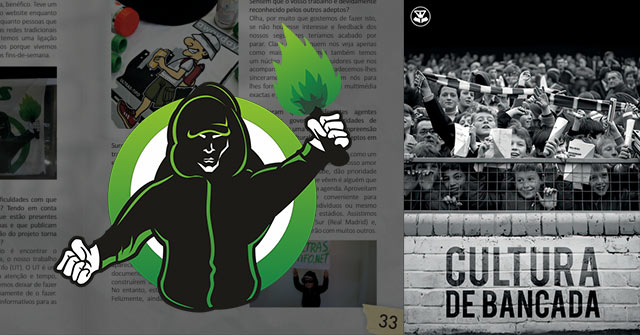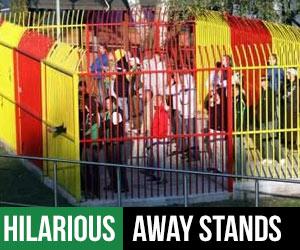Want to buy pyrotechnics? Visit pyro.ultras-tifo.net

Cultura de Bancada: UT Interview
In the end of 2023, we conducted an interview with the Portuguese fanzine 'Cultura de Bancada,' who contacted us aiming to shed light on Ultras-Tifo.
The original interview in the Portuguese language is available in their Fanzine #20, which can be found here and includes various other intriguing materials: [LINK].
Below is the English translation:
How and when did the Ultras-Tifo project start? What were the initial objectives of the project? Do they remain the same, or over time, have you added more? Who makes up your team, and how is your team composed? Are you all from the same country?
- Allow me to introduce myself. I am from Bulgaria and one of the three individuals behind ULTRAS-TIFO.net (UT). I joined the team in 2010, although I had been participating in the forum for several years before that. Ultras-Tifo was initially founded in December 2004, as a forum with the main purpose of connecting people from the ultras community worldwide, facilitating the sharing of pictures and information among them.
The creation of UT was a collaborative effort involving two brothers, fans of Sporting CP, whose colors influenced our identity, and a Norwegian. Shortly after, the two brothers left the project as they both joined the military, leaving our Norwegian admin to handle things solo. A bit later, a second individual, a Croatian, joined the team. As I mentioned, I became a part of UT in 2010.
By that time (2010), our website had been running for a few years, and our Facebook page was established. UT evolved into a kind of 'media' website, coinciding with the gradual decline of forums. Nowadays, people have real-time access to social media platforms like Instagram, Twitter, and more, yet UT continues to attract a significant number of visitors every month who enjoy our articles, photo reports, and other types of publications.
Do you consider being an ultras to be of significant importance in your lives and personal development? How has the project contributed to your personal development and even as ultras?
- Absolutely, being ultras and attending matches all these years has undoubtedly been beneficial. It has had a positive impact on the website as a project and on us as individuals managing it. Unlike traditional media networks, we have a deep connection to what we do because we experience it as a real emotion every weekend.
What are the biggest difficulties that Ultras-Tifo encounters? Considering that you manage the site, that you are present on different platforms, and publish regularly, does the size of the project make your task more difficult?
- Our biggest challenge is finding the balance between family, our real-life work, and Ultras-Tifo
UT is a project that demands a lot of attention at times, but it's something we can't let go of because we genuinely love doing it. We enjoy being helpful and informative to people, but the most rewarding aspect is the strong connections it has helped us build with others throughout the years. We can confidently say that we wouldn't have met or connected with many of these people if it weren't for the website.
New platforms have emerged that have transformed the dissemination of information among organized supporters. Do you believe that the search for instant protagonism can be harmful to the movement, or do you think it brings something positive? Is it necessary to have discretion in what is published?
- Like everything else, there are both positive and negative aspects, depending on how it's utilized. What personally leaves a negative impression on me is the hooligan part of these 'reports.' Nowadays, you often see young groups posting things like 'we're here, looking for X, but no show,' as if they're trying to document every single moment to build an image for themselves. However, this approach doesn't work. Fortunately, there are still many serious groups that stick to the 'old way' of more discreet actions, only revealing them after the fact - that's the romantic aspect.
On the bright side, one positive aspect is that nowadays, you can easily see photos from a specific match almost in real-time. I remember the days when I had to wait for someone to share a photo from a game, sometimes waiting for days.
Do you feel that your work is duly recognized by other supporters?
- Look, as much as we are attached to doing this, if it didn't receive interest and feedback from our followers, we would have eventually stopped. Of course, there are some who see us as just another web portal, but we also have a very loyal core of followers who have stuck with us for years. We extend our heartfelt thanks to them for trusting us to provide them with accurate and genuine information and multimedia.
Do you consider that the various sports agents, governments and security authorities have a real understanding of the cultural phenomenon, which are supporters in general and ultras in specific?
- No, those types of people view us as a problem. They don't care about our love for a particular club; they prioritize business. All they see is someone who might interfere with their agenda. They seize any convenient opportunity to ban individuals or even entire groups from stadiums. We've witnessed this with Ultras Sur (Real Madrid), and unfortunately, it's a pattern with many others.
What are the core causes for which it is essential to fight during the next decade in the ultras movement?
- As sad or mundane as it may sound, our struggle is fundamentally about our right to be in the stadiums. Many clubs, especially the larger ones that attract a lot of 'tourist' interest, are increasingly indifferent to the ultras. They don't mind if there isn't anyone singing because they can still sell tickets to fill those seats with tourists and 'theatre spectators.' I can't claim to know how we can win the fight for 'to be or not to be,' but I'm certain that we will all fight by any means necessary to assert our right to be present. It's essential to acknowledge that ultras bring the purest form of love and passion to their clubs.
What do you think about fan culture and the ultra movement in Portugal?
- A good scene with its own characteristics, much like many others in Europe. Particularly in the past when everything was more relaxed and accessible. Nowadays, there's a lot of repression against ultras, as I mentioned earlier. Unfortunately, this is the case everywhere, but we still witness some great actions, both within and outside the stadiums.
What paths do you believe should be followed so that there is a reinforcement of the fan culture and the ultras themselves?
- I'm fully supportive of carrying on the traditions of the past. Older individuals should engage with the younger generation who are new to the ultras scene. They should explain that being an ultras is more than just supporting your team for 90 minutes or engaging in conflicts with other supporters. It's a distinct way of life that extends beyond football. Once you've demonstrated your commitment and seriousness, you cease to be just one of many fans and become part of a family that assists each other in various aspects of life. Moreover, you proudly stand as a shield for your club, its colors, your city, and brothers.
What do you think of fanzines as a means of communication? Do you consider it important for the development of this culture in people?
- I love them. In the past, I used to purchase many issues of the Italian Supertifo and Fan's Magazine, even though I don't personally speak Italian. I did it out of sheer affection for that particular scene. Now, I have accumulated hundreds of these magazines with thousands of photos, most of which are not available on the internet. Therefore, for me, seeing a present-day fanzine feels like a blast from the past. I'm fully supportive of the groups and people who continue to create them.
A final message to our readers, please.
- Stay true to your family, friends, and principles, for in this crazy world, they are all we have.









